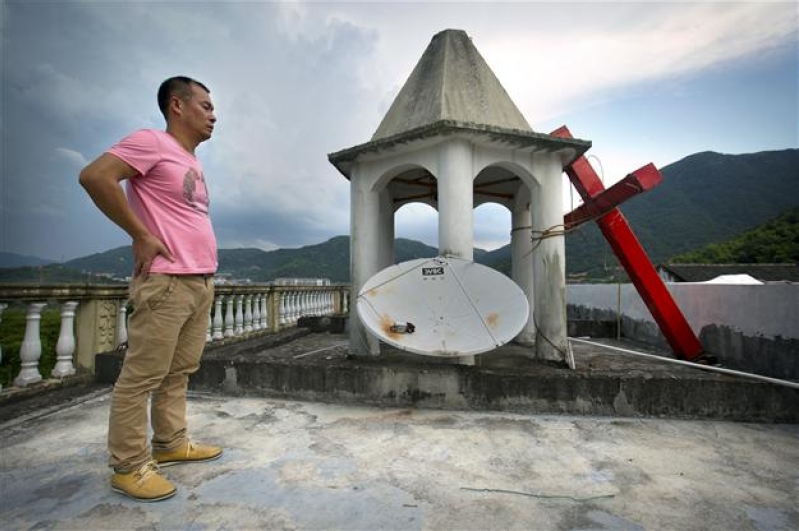
A number of Christians protesting the demolition of over a dozen church crosses in China's coastal Zhejiang province this past week were beaten and bloodied after clashing with Chinese officers.
According to a recent report from China Aid, an organization which tracks Christian persecution in China, over 100 demolition workers took down the cross atop Shangen Church last week, and severely injured a female church member protesting the move.
"The woman was knocked to the ground and later taken to the hospital for her injures. Police and security guards at the demolition were armored and carried riot shields to hold back church members," China Aid explained.
A number of other churches saw their crosses taken down last week as well, including Qianbao Christian Church, Qianzhuang Christian Church, and Fenggangta Church. One anonymous church member described the demolition, saying: "[The officers] ordered us not to resist. [They said] if we put up a fight, they would tear down the church instead."
The report notes that since 2014, the prefecture-level city of Wenzhou, Zhejiang - commonly referred to as the "Jerusalem of China" due to its large Christian population - has been the focus of a massive "beautification" campaign known as "Three Rectifications and One Demolition."
Over the course of the campaign, Wenzhou authorities have demolished more than 2,000 church crosses, often claiming that the structures are illegally constructed and violate zoning laws.
However, rights groups argue that destroying crosses restricts Christianity and religious freedoms. According to the New York Times, the targeting of believers in Zhejiang highlights the Chinese leadership's discomfort with the growing allure of Christianity, whose followers are said to rival in number the 86 million members of the Communist Party.
The Christian Post notes that the churches have been given the option to voluntarily dismantle the crosses, or risk forcing the government to send soldiers to forcibly taken them down. Churches that refuse to obey such orders have also been punished by having their water and electricity cut out.
Pastors and human rights activists who protest the campaign have also been targeted in the crackdown. As reported by The Gospel Herald, megachurch leader Gu Yuese of Hangzhou's Chongyi Church, the largest government sanctioned church in China, was arrested after he refused to remove crosses in the church. However, authorities said he has been charged with corruption and embezzlement.
Carsten Vala, an authority on Christianity in China at Loyola University Maryland, told the Christian Science Monitor that the action against Gu "appears to show that political or civil space in China outside the party is shrinking."
"What is most worrying is that the crackdown on lawyers and civil society activists is now even reaching into the circles of officially registered religious and social organizations," Mr. Vala says. "Not just unregistered groups. After all, Pastor Gu is a leader of the official churches of the Chinese Communist Party-backed Three Self Patriotic Movement association."
Similarly, Pastor Bao Guohua and his wife Xing Wenxiang have been sentenced to spend 14 years in jail after Chinese authorities charged them with social disorder and corruption. But, according to the supporters of the couple, the indictment on the two exemplifies the government's actions against Christian activities in the country.
The government has also brought formal charges against nearly 20 human rights lawyers who spoke out against the demolitions in the province, and authorities have broadcast coerced "confessions" from several of them.






